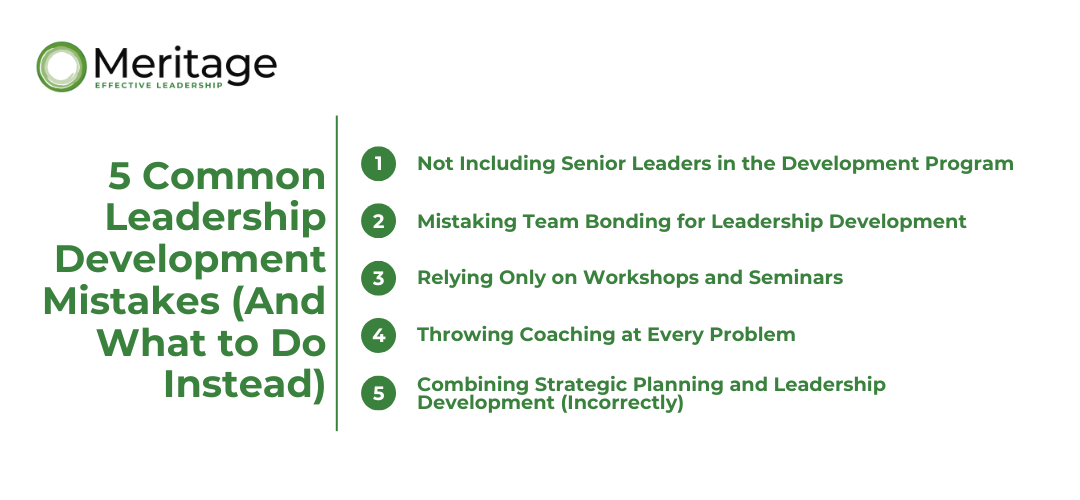By now you know your company needs to invest in leadership development activities. You’ve read all those articles about how leadership development contributes to employee satisfaction and retention. Your HR department has a nice budget for conferences, consultants, and workshops and you’re ready to write a check.
Wait! Before you book that weekend at the ropes course for your senior leadership teams, let’s talk about some of the most common mistakes companies make when it comes to leadership development.
Not sure where to start with leadership development? Take our free leadership Enneagram quiz to learn what kind of leader you are.
1. Not Including Senior Leaders in the Development Program
How did you feel when you were a kid and spotted your dad eating a slice of cake right before dinner, only to be admonished with “Do as I say, not as I do”? It probably didn’t feel particularly fair then. It doesn’t feel particularly fair now.
If you’re a senior leader, you really need to walk the talk and take part in leadership development. When you do, you’re creating consistency and demonstrating what effective leadership looks like within your company’s culture. Great leaders model what they expect — here’s how to build executive presence through development, not delegation.
As we’ve talked about before, humility is one of the most underappreciated qualities of great leaders. When you’re willing to take part in leadership development yourself, you’re showing that you’re not ‘above’ it.

2. Mistaking Team Bonding for Leadership Development
Team bonding is great; it absolutely has its place. A team that communicates well and has caring connections to each other will always be more effective than a disjointed, disconnected team.
But let’s be honest: A company is not going to discover skill and behavior gaps through a group cooking course. Your CMO probably won’t get over their delegation issues after a weekend of trust falls. Your CFO probably won’t internalize the importance of appreciation and praise because they played a few rounds of “Two Truths And A Lie.”
3. Relying Only on Workshops and Seminars
Again, these are great tools but they should be used in conjunction with deeper, more personal, more insightful methods.
By definition, workshops and seminars are group activities – one expert educates a lot of people, all at once. No matter how great that expert is, they can’t answer every question or give personalized, in-depth feedback to every participant. There will never be a workshop that is 100% applicable to 100% of the participants.
Because many workshops and seminars occur outside of traditional work hours or work spaces, it’s easy for staff to get caught up in the spirit of workshop … and then forget all about what they learned once they’re back in the office. To ensure real behavior change, use assessments like the Enneagram Applied to tailor insights to each leader’s style.
In addition to seminars and workshops, an effective leadership development plan also includes some assessment tools – like a 360 or leadership style assessments. These assessments give leaders a clear picture of where they are today and where they can grow.
Want more than theory? Our Leadership EDGE course gives leaders real tools, feedback, and sustainable growth strategies.
4. Throwing Coaching at Every Problem
Some consultants will try to sell you an intensive coaching program for every employee. While one-on-one coaching can be incredibly effective, it’s not necessarily the best use of resources.
We suggest an approach that combines 360 assessments and some leadership coaching. We also recommend cohort-based workshops and offsites where leaders learn to coach each other through their challenges. After 20+ years of working in leadership development, I can say with complete conviction: this approach works. Peer coaching is a powerful tool in high-performing teams — especially when guided by structured learning paths.
5. Combining Strategic Planning and Leadership Development (Incorrectly)
Should your strategic planning and leadership development be pursued jointly? Yes! Can your company substitute one for the other? No.
Your strategic planning is about determining where your company will go in the next 1-3 years. You refine the priorities you will focus on – the what of the next few years.
Leadership development is about considering how you will engage as leaders to make your strategic plan happen. What mindsets will you need to shift for your strategic plan to stick? Do you need to hire new people? Fill skill gaps? Change the way you lead?
When companies make strategic plans without considering how they need to shift their leadership they’re limiting how successful that plan can be. There’s absolutely a place for ropes courses in your HR budget, but leaders can’t grow on a diet of off-sites and workshops. Make sure you avoid these common leadership development mistakes and you’ll be good to go!

Looking to revamp your leadership development strategy? Our bespoke coaching and cohort programs deliver real, lasting impact.


